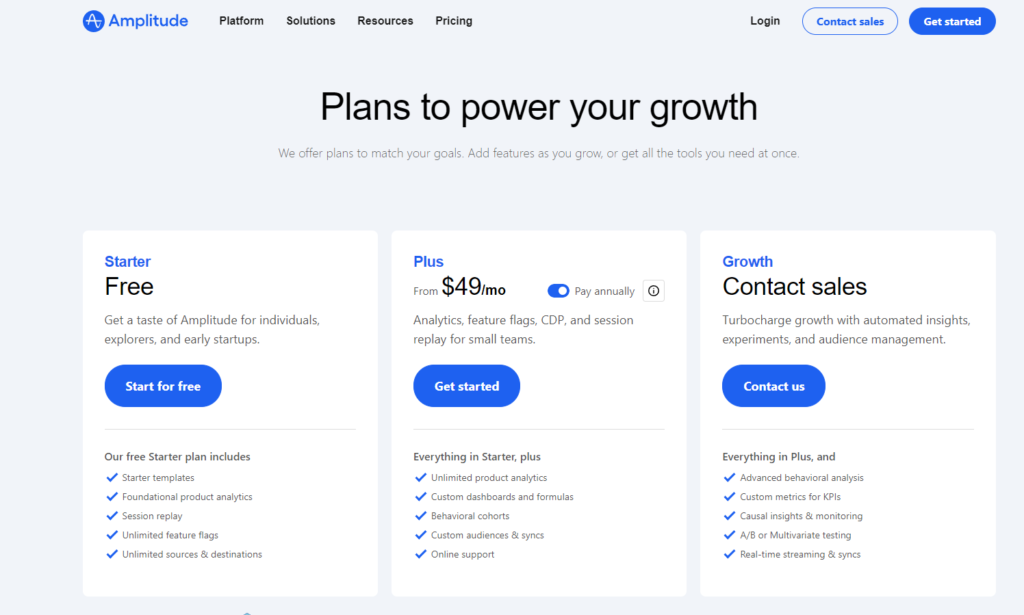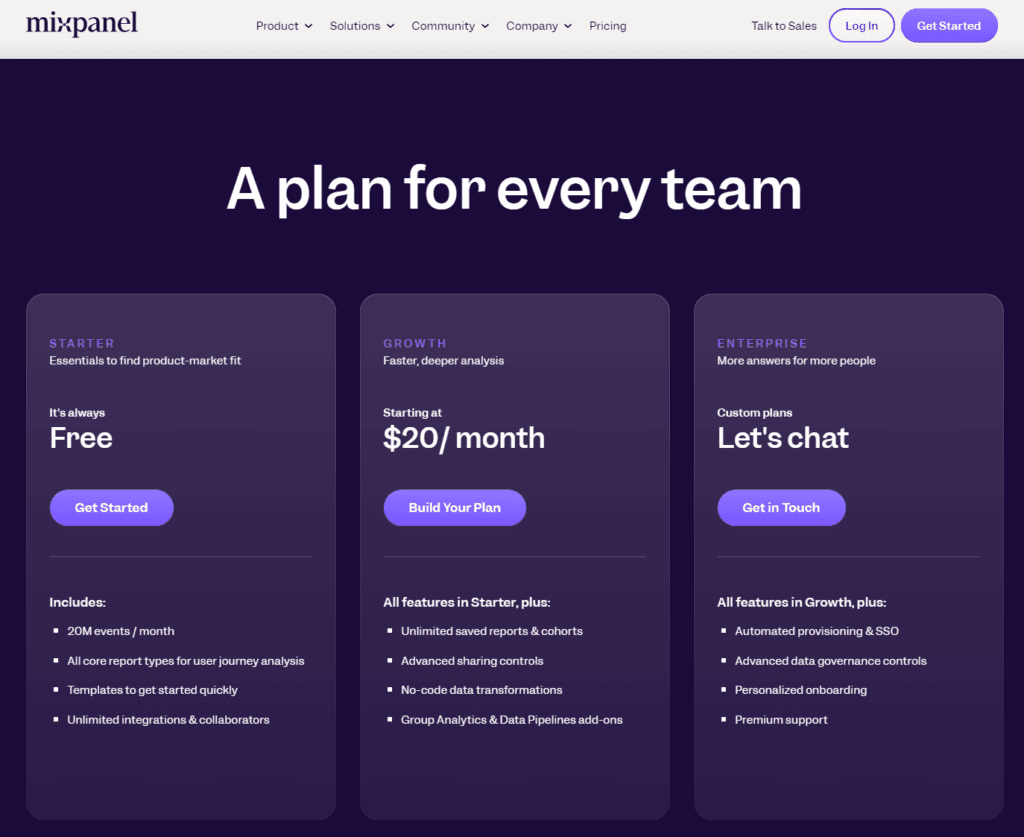In the dynamic world of digital analytics, two giants stand tall: Amplitude and Mixpanel. Each platform offers a treasure trove of insights, promising to illuminate the path to user engagement and product success. But as every savvy navigator knows, choosing the right compass is essential for charting a course to treasure. Let’s embark on a journey to uncover which tool, Amplitude or Mixpanel, is the best fit for your digital analytics needs, starting with a critical comparison: Event Tracking and User Behavior Analysis.
Amplitude | Mixpanel |
|---|---|
| G2 Score – 4.5 out of 5 stars | G2 Score – 4.6 out of 5 stars |
| TrustRadius Score – 8.3/10 | TrustRadius Score – 8.4/10 |
Event Tracking and User Behavior Analysis: The Heartbeat of Analytics
In the quest to understand and enhance the user experience, event tracking and user behavior analysis are akin to setting the sails for a voyage. They determine the direction and speed at which you can navigate the vast seas of user data. Here’s how Amplitude and Mixpanel fare in these crucial areas.
Amplitude: The Deep Dive Explorer
Amplitude offers a deep dive into the ocean of user behavior, providing granular insights into every interaction. Its event tracking capabilities are robust, allowing you to capture and analyze a wide array of user actions. This granularity enables businesses to piece together detailed user journey maps, uncovering the nuances of how users interact with their product.
Where Amplitude truly excels is in its segmentation and analysis features. You can slice and dice your data in countless ways, uncovering patterns and behaviors that are not immediately obvious. Amplitude’s real-time analytics further enhance its offering, providing immediate feedback on user actions and enabling businesses to react swiftly to emerging trends. For teams focused on understanding the depths of user behavior to drive product development and optimization, Amplitude offers the precision tools needed for the job.
Mixpanel: The Agile Navigator
Mixpanel, on the other hand, emphasizes agility in navigating the user analytics sea. Its event tracking is designed to be intuitive, making it easy for teams to set up and start analyzing user actions. Mixpanel shines in its ability to provide actionable insights quickly, with a user interface that’s both powerful and accessible.
Mixpanel’s segmentation capabilities are also noteworthy, offering businesses the flexibility to explore their data from various angles. Where it stands out is in its approach to funnel analysis and retention tracking, providing clear, actionable insights that help businesses optimize their user flow and improve retention rates. For teams looking for a tool that combines ease of use with powerful analytics capabilities, Mixpanel is a compelling choice.
Integration Capabilities: The Digital Ecosystem Architects
In today’s digital ecosystem, a tool’s ability to seamlessly integrate with other technologies can be the difference between siloed data and a cohesive analytics strategy. Let’s see how Amplitude and Mixpanel perform when it comes to playing nice with other software.
Amplitude: Crafting a Seamless Data Landscape
Amplitude understands the importance of a connected digital ecosystem. It offers robust integration capabilities with a wide variety of platforms, from marketing automation tools and CRM systems to data warehouses and collaboration tools. This extensive network of integrations enables businesses to bring together disparate data sources, creating a unified view of the customer journey.
Beyond just the quantity of integrations, Amplitude focuses on the quality and depth of these connections. Integrations are designed to be deep and functional, allowing for a two-way flow of data. This means not only can you enrich Amplitude’s insights with external data, but you can also leverage Amplitude’s analytics to trigger actions in other tools, effectively closing the loop between insight and action. For organizations looking to build a sophisticated, interconnected analytics framework, Amplitude offers the tools to make it happen.
Mixpanel: The Agile Connector
Mixpanel, much like Amplitude, places a high value on the ability to integrate with other tools. It offers a solid range of integrations with key platforms in marketing, product development, and customer service spaces. Mixpanel’s integrations are focused on ensuring that users can easily send data to Mixpanel from their favorite tools and, just as importantly, export insights from Mixpanel to inform strategies in other platforms.
Where Mixpanel shines is in its approach to making these integrations as user-friendly as possible. The goal is to minimize the technical barriers to integration, making it easier for businesses of all sizes to start connecting their tools. For teams that need a straightforward, effective way to link their analytics with their operational tools, Mixpanel provides a streamlined path to integration.

Related: Check out our free SEO suite

Reporting and Dashboard Customization: Tailoring Your Analytics View
The ability to customize reports and dashboards to fit your specific business needs can significantly enhance the insights you draw from your analytics tool. Let’s see how Amplitude and Mixpanel stack up in enabling businesses to tailor their analytics views.
Amplitude: The Master Tailor
Amplitude offers extensive customization options for its reporting and dashboards, understanding that businesses have unique needs and questions they seek to answer through data. Users can create custom dashboards from scratch or utilize Amplitude’s library of templates as a starting point. Each widget or chart on a dashboard can be deeply customized to show the exact metrics and segments you care about.
Beyond visual customization, Amplitude allows users to drill down into the data directly from dashboards, making it easy to explore underlying patterns without leaving the context of their report. This level of interactivity and customization makes Amplitude a powerful tool for businesses that rely heavily on custom analytics views to inform their decision-making processes.
Mixpanel: The Agile Dashboard Designer
Mixpanel, on the other hand, emphasizes agility and ease of use in its dashboard and reporting customization. Its user interface is designed to be intuitive, allowing even those with limited analytics experience to quickly set up and modify dashboards. Mixpanel offers a variety of visualization options and lets users filter and break down data directly within dashboards, ensuring that the insights you need are always at your fingertips.
While Mixpanel may not offer as deep customization as Amplitude in every aspect, its strength lies in the speed and simplicity with which users can create meaningful, actionable reports. This approach aligns well with businesses looking for quick insights and the ability to iterate on their analytics views without needing extensive technical knowledge.
Customer Support and Community Resources: Navigating the Waters of Analytics
In the fast-paced world of digital analytics, having access to responsive, knowledgeable support and a vibrant community can be invaluable. These resources not only help in resolving technical challenges but also in maximizing the potential of the analytics platform. Let’s explore how Amplitude and Mixpanel cater to their users in this regard.
Amplitude: Dedicated Support and Rich Learning Resources
Amplitude takes customer support seriously, offering various channels to ensure users can find the help they need when they need it. For businesses on premium plans, Amplitude provides dedicated account management and technical support, ensuring personalized assistance for complex issues or strategic guidance. All users have access to a comprehensive knowledge base, detailed documentation, and Amplitude’s community forums, where they can seek advice, share insights, and learn from the experiences of other users.
Moreover, Amplitude invests in user education through Amplitude Academy, offering courses that range from basic to advanced analytics techniques. This commitment to educating users not only helps in resolving immediate issues but also empowers teams to leverage Amplitude to its full potential, fostering a deeper understanding of data-driven strategies.
Mixpanel: Agile Support and Empowering Community
Mixpanel also places a high emphasis on customer support and community engagement. It offers a tiered support system, ensuring that users on all plans have access to help through documentation, email support, and for those on higher-tier plans, direct phone support. Mixpanel’s documentation is known for its clarity and helpfulness, covering a wide array of topics from setup to advanced analysis.
The Mixpanel community forums are a hub of activity, bustling with discussions, tips, and shared best practices. Mixpanel encourages user engagement through regular webinars and workshops, which not only address how to use the platform but also broader topics in analytics and product development. This approach not only solves user issues but also creates an environment where users can continuously learn and grow.
Pricing and Value: Balancing Cost with Capabilities
Amplitude: Strategic Investment for Depth
Amplitude’s pricing structure is designed to cater to a range of business sizes and needs, from startups to large enterprises. While specific pricing details are tailored and often require direct engagement with Amplitude for quotes, it’s known that Amplitude operates on a tiered model. This model provides access to more advanced features, increased data history, and higher event volumes as you move up the tiers.
The value proposition of Amplitude lies in its depth of analytics and customization capabilities. For businesses that are data-driven and rely heavily on nuanced user behavior insights to drive product decisions, Amplitude represents a strategic investment. The platform’s focus on detailed event tracking and user journey analysis offers a level of insight that can be pivotal for optimizing user experiences and enhancing product engagement.
Mixpanel: Agile Analytics Within Reach
Mixpanel offers a transparent pricing model, with plans detailed on its website, making it easy for potential users to understand their investment upfront. Mixpanel’s pricing includes free, growth, and enterprise tiers, each designed to meet users at different stages of their analytics journey. The free tier provides access to basic analytics features, making it a great starting point for small teams and startups.
The real value of Mixpanel comes from its ability to offer powerful, actionable insights without a steep learning curve or extensive setup. Mixpanel’s growth and enterprise plans expand on the capabilities available in the free tier, offering more advanced analysis tools, higher data limits, and additional customization options. For businesses looking for an agile analytics solution that balances cost with a robust set of features, Mixpanel presents an attractive option.
Pricing
Amplitude:

Mixpanel:

Conclusion
In wrapping up our exploration of Amplitude and Mixpanel, it’s evident that both platforms offer robust solutions tailored to empower businesses with deep insights into user behavior and analytics.
Amplitude stands out for its depth of analysis, offering comprehensive event tracking and user segmentation capabilities ideal for businesses looking to dive deep into user interactions and optimize product experiences. Its strategic approach to analytics makes it suitable for organizations ready to invest in understanding the nuanced behaviors driving user engagement.
Mixpanel, on the other hand, shines with its agility and user-friendly interface, providing powerful insights without a steep learning curve. Its transparent pricing model and tiered plans cater to businesses of all sizes, making advanced analytics accessible to startups and SMBs, as well as scaling to meet the needs of larger enterprises.
Read Next:
- GetResponse vs Zoho Campaigns: The Best Email Marketing Tool for 2024
- AWeber vs ActiveCampaign: The Best Email Marketing Tool
- Constant Contact vs Campaigner: Best Email Marketing Tool
- GetResponse vs Omnisend: The Best Email Marketing Tool for 2024
- AWeber vs Benchmark Email: The Best Email Marketing Tool






















Comments are closed.